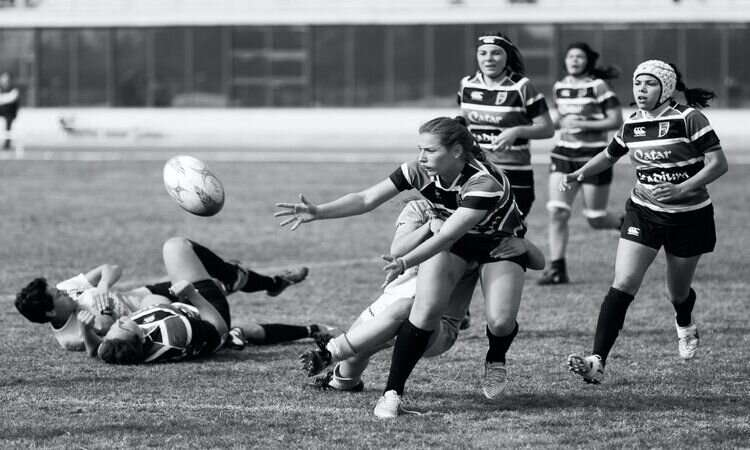This article has been reviewed according to Science X's editorial process and policies. Editors have highlighted the following attributes while ensuring the content's credibility:
fact-checked
peer-reviewed publication
trusted source
proofread
Tackling the problem of safe participation in women's rugby

Trinity researchers highlight the complexity of tackle skill learning and tackle injury mitigation in women's rugby union by uncovering how rugby culture and interactions with teammates, coaches, clubs and wider society shape player behaviors and experiences.
A study by Trinity researchers has found that women's experiences of tackle injury and skill learning were intertwined with the day-to-day realities of marginalization and under preparedness in the sport. The study, published in the British Journal of Sports Medicine is grounded in the voices of women and has provided recommendations for key stakeholders to support tackle injury prevention in women's rugby.
The research was led by Kathryn Dane, Trinity College Dublin Ph.D. student (Discipline of Physiotherapy) and Irish Rugby International.
Women's Rugby is one of the fastest growing sports worldwide, currently evidenced by record breaking crowds at the 2023 Women's Six Nations Championship. The tackle is a highly complex skill that is central to safe participation and success in rugby. It requires technical, tactical, physical and psychological proficiency and capacity to execute safely and effectively.
Tackle-related injuries remain a problem in the women's game, accounting for up to 67% of all match injuries. World Rugby has committed to funding evidence-informed injury prevention programs, but research in women's rugby is still playing catch-up. We can only assume that tackle coaching frameworks and player protection strategies are likely informed by research in men's rugby.
Speaking of the research, Kathryn Dane said, "Giving voice to women's rugby players has provided unique insights into the complexity of tackle skill learning and tackle injury. By adopting a nuanced approach that accounts for the performance context and preferences of women's rugby players we will be better placed to protect player health in rugby."
A deeper understanding of the performance context is essential for the success of player protection strategies, so the Trinity team employed qualitative interviews to give voice to women's rugby players and listen to their experiences of tackle skill learning and tackle injuries.
The study comprised in depth interviews with female players across continents of Europe, South Africa and Canada, exploring their experiences of rugby tackling and their experiences around preparation and injury.
Findings
- Participants reported a sense of fear and lack of confidence in their experience of tackling but felt that tackle injuries were an inevitable part of the game.
- Players experienced countless injuries and were intentionally dismissive of them.
- Injuries were only taken seriously when they impeded a player's ability to perform.
- Unhealthy tackle injury beliefs and behaviors were accepted and encouraged by teammates and coaches and shaped by a rugby culture that rewards being brave and "putting your body on the line."
- Participants identified how their status as women and late starters in rugby increased their injury susceptibility.
- The differences in the training ages and performance pathways between men's and women's rugby necessitates a nuanced approach to how we coach women to tackle.
- These constraining injury experiences were situated alongside tackle coaching that paid little attention to the training age, development and learning needs of their players.
- These experiences overlapped with inequalities in club structures where women's rugby teams counted themselves lucky to have access to the gym, pitches, coaching and pitch side medical support.
- Day-to-day experiences of gender stereotypes, homophobia and stigma from wider society further positioned women as interlopers in the sport.
Researchers noted that some coaches do empower players and instill effective tackle techniques and healthier tackle injury behaviors. These coaches were happy to take extra time and tailor drills to the training age and learning needs of the individuals and sought player feedback to inform training and placed a higher value on player well-being over performance.
Dr. Fiona Wilson, head of discipline of physiotherapy, School of Medicine, Trinity College and co-author of the study, said, "This powerful research puts the players' voices and their lived experience at the center. It provides some clear practical take home messages that can be used in designing safe and effective tackle frameworks for women playing rugby in this current era of rapid development."
Recommendations
In order to better protect women's rugby players, researchers suggest the women's game needs nuanced strategies that involve:
- Collaboration and collective action between players, coaches, governing bodies, media and match officials that reflects the complexity of the skill of tackling and the performance context of women's rugby.
- Organizations to address the implicit gender bias that exists in rugby by giving women "a seat at the table" to create inclusive, equitable and safer playing environments for women's rugby players.
More information: Kathryn Dane et al, 'Body on the line': experiences of tackle injury in women's rugby union—a grounded theory study, British Journal of Sports Medicine (2023). DOI: 10.1136/bjsports-2022-106243





















